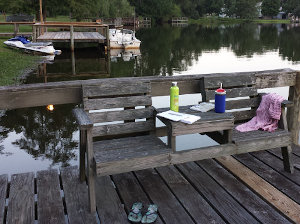AmblesideOnline's Patio Chats:
2. About Charlotte Mason

Are you new to a Charlotte Mason (CM) education and wondering what it's all about? Here's a quick run-down.
From a CM perspective, the child is a bona-fide, full fledged person made in God's image, complete in his personhood in the same way that a seed is complete and already has everything within it to become a plant. The child is an individual to be treated with dignity and respect. This respect for the child drives everything about a CM education. It means his education isn't supposed to make him fit the world -- there's a larger purpose. His education builds him up as a person and broadens his mind by connecting him to the world around him, building relationships with God and people from various places and times. The goal isn't to make him a suitable employee, but to make him a useful person in general with a heart to serve others, and an ability to find joy in his surroundings.
Plenty of time is spent outdoors to introduce him to the wonders of God's creation, but this time isn't all idle. There are times of specific nature observation to learn the ways of plants and animals, and to teach him what's in his own backyard.
He learns to focus his attention fully on his schoolwork, so his lessons are shorter and yet more effective. That means less time doing school and more free time for personal interests.
There are plenty of interesting things to think about and keep his mind busy. Most of these stimulating ideas come from books -- but not just any book. Pleasant, narrative books that use well-written language serve a double purpose by reinforcing language arts while teaching in an engaging way. Narration, or telling back the story, forces his mind to process those ideas and make them "his own."
Copywork and dictation are the bulk of language arts instruction. They may seem simple, but they are effective enough on their own to eliminate the need for spelling books, vocabulary lists and handwriting programs.
The educational course of study is carefully planned, and the teacher helps as a guide and co-learner, but the actual learning is the responsibility of the child. Nobody can learn his lessons for him.
That's a very condensed version, and there's more there than meets the eye, but we'll be going over each aspect over the year. Consider these chats as your weekly educational reading assignments -- your child has a weekly schedule of reading, and now Teacher does, too. :-)
Have a great week!

